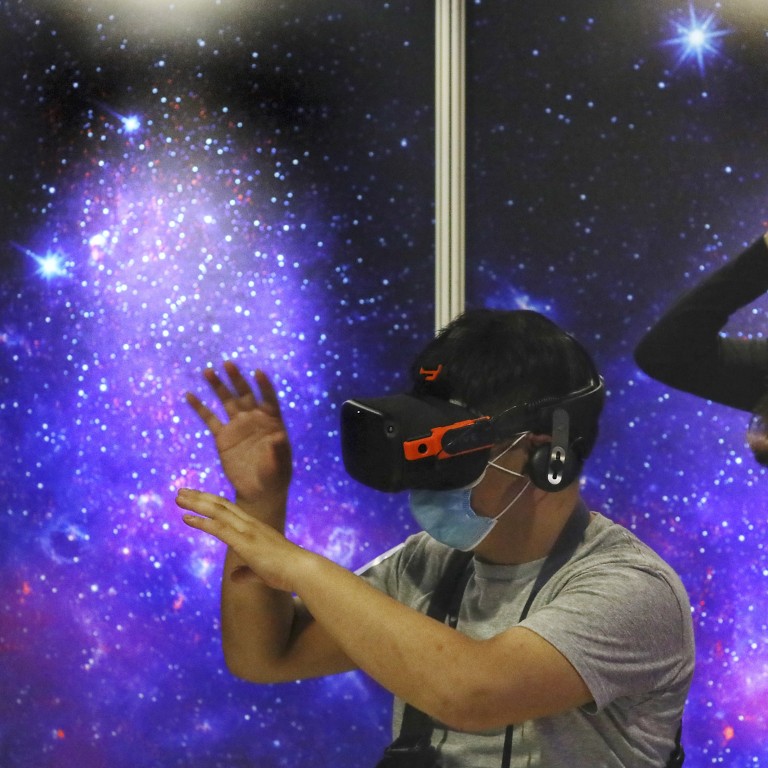
Why Chinese tech giants are embracing the metaverse despite state media warnings
- Bilibili says it has great potential to develop the metaverse after Tencent and NetEase made similar declarations
- The People’s Daily cautions investors against falling into what it sees as a market hype around the metaverse
Tech giants in China are feeling pressured to assert their presence in global discussions about the metaverse to avoid losing out to Western peers despite caution from authorities, analysts said.
Also this month, telecoms juggernauts China Mobile, China Unicom and China Telecom partnered with several tech companies to form the Metaverse Industry Committee, China’s first industry group dedicated to the concept.
What is the metaverse, how will it work and why does Facebook want in?
Amid the rush by Chinese companies to embrace the metaverse, however, state media outlets in the country have been warning investors against buying into the hype.
On Thursday, People’s Daily, the Chinese Communist Party’s mouthpiece, warned against what it sees as a market frenzy, saying that “everyone still needs to stay rational in understanding the current metaverse mania”.
Last week, the state-run Economic Daily also cautioned against speculative trading in metaverse concept stocks, sending share prices tumbling before paring losses this week. In a commentary, the newspaper said that retail traders should not hastily put money into an “immature” concept like the metaverse since it is a project that requires long-term investment and development.
Still, Chinese tech firms are now racing to embrace the metaverse because they cannot afford a slow start, said analysts.
It takes years for companies to build sophisticated metaverse experiences, putting late starters at a disadvantage once the concept becomes mainstream, said Serkan Toto, chief executive of Tokyo-based consultancy Kantan Games. The metaverse industry is forecast to be worth US$800 billion by 2024, according to Bloomberg Intelligence.
“The Chinese powerhouses don’t want to be left behind in the metaverse war,” said Toto. “The term is everywhere right now, putting these companies under pressure to at least acknowledge the phenomenon and show that they have started thinking about it.”
‘Ready Player One’ wasn’t wrong – a whole digital world awaits us
Public interest around the metaverse gained momentum this year after Epic Games, developer of Fortnite, argued in its lawsuit against Apple that the iOS App Store’s requirement for developers to use Apple’s payment system makes it difficult to build an identical metaverse experience across different platforms. Around the same time, Roblox, a game creation platform that went public in March, made the metaverse a core part of the company’s mission.
Chinese tech giants have likely been positioning themselves towards the metaverse for months, if not years, said Chenyu Cui, a senior research analyst for games at London-based consultancy Omdia. However, Facebook and Microsoft’s declarations will likely encourage the Chinese companies to accelerate their exploration of the concept, Cui said.
“Tencent has invested in Roblox. ByteDance has acquired [VR company] Pico, and NetEase has invested in [metaverse social network] IMVU and some sandbox games. These actions suggest that these giants are directing resources to these popular concepts and trends,” Cui said.
Daniel Ahmad, senior analyst at video gaming research firm Niko Partners, also said that Chinese giants have been preparing for the metaverse for a while.
“Niko Partners believes that live service video games have been building towards this metaverse concept for a number of years and that companies with experience in both video game development and social media will have an advantage when entering this space,” Ahmad wrote in a research note.
Razer CEO says Covid-19 has accelerated path to the ‘Metaverse’
Ahmad said that Tencent is well positioned to take a leading role in developing a metaverse that connects its games and social networks.
“The company has made key investments in Epic Games (Unreal Engine, Fortnite) and Roblox (Roblox), which are considered metaverse products today. The company has also ramped up hiring at its global studios to develop metaverse-focused games,” Ahmad said.
However, regulations are expected to play a key role in deciding the type of metaverse content and experiences that companies in China can monetise, said Ahmad.
“We note that Fortnite was not approved for release in China despite its all-ages approach. User generated content has also faced issues in the past with platforms such as Minecraft being fined for including inappropriate content,” said Ahmad.
The metaverse will therefore likely evolve differently in China compared to the rest of the world, said Ahmad.

